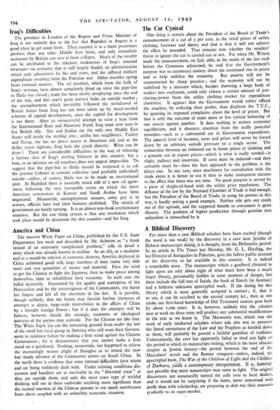A Biblical Discovery
For more than a year Biblical scholars have been excited (though the word is too weak) by the discovery in a cave near Jericho of Hebrew manuscripts dating, it is thought, from the Hellenistic period. In an article in The Times last Monday, Mr. G. L. Harding, the last Director of Antiquities in Palestine, gave the fullest publicaccount of the discovery so far available in this country. It is indeed a remarkable story. The manuscripts which a goatherd chanced to light upon are only about .eight of what must have been a much larger library, presumably hidden in some moment of danger, but these include the full text of Isaiah, the book of Enoch (in Aramaic) and a hitherto unknown apocryphal work. If the dating for this library which is most generally accepted is correct; if, that is to say, it can be ascribed to the second century B.C., then at one stroke our first-hand knowledge of Old Testament sources goes back by about ',too years. It is, however, unlikely that the scholars now at work on these texts will produce any substantial modifications in the text as we know it. The Massoretic text, which was the work of early mediaeval scholars whose sole aim was to preserve the literal correctness of the Law and the Prophets as handed down to them, will probably be proved a faithful guardian of tradition. Unfortunately, the cave has apparently failed to shed any light on the period to which its manuscripts belong, which is the most obscure chapter in Jewish history—the period between the end of the Maccabees' revolt and the Roman conquest—unless, indeed, tilt apocryphal book, The War of the Children of Light and the Children of Darkness, yields a contemporary interpretation. It is, however just possible that more manuscripts may come to light. The original discoverers not unnaturally turned the rolls over to local dealers, and it would not be surprising if the latter, more concerned with profit than with scholarship, are preparing to dole out their treasures gradually to an eager market.






























 Previous page
Previous page